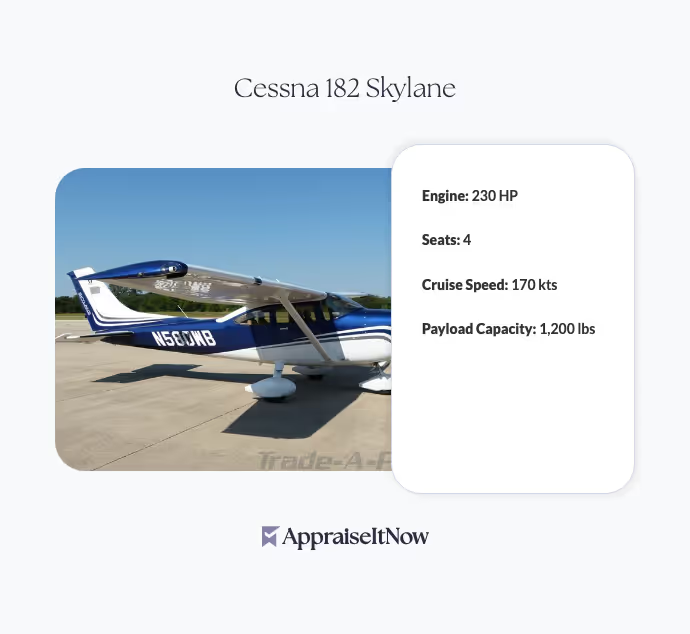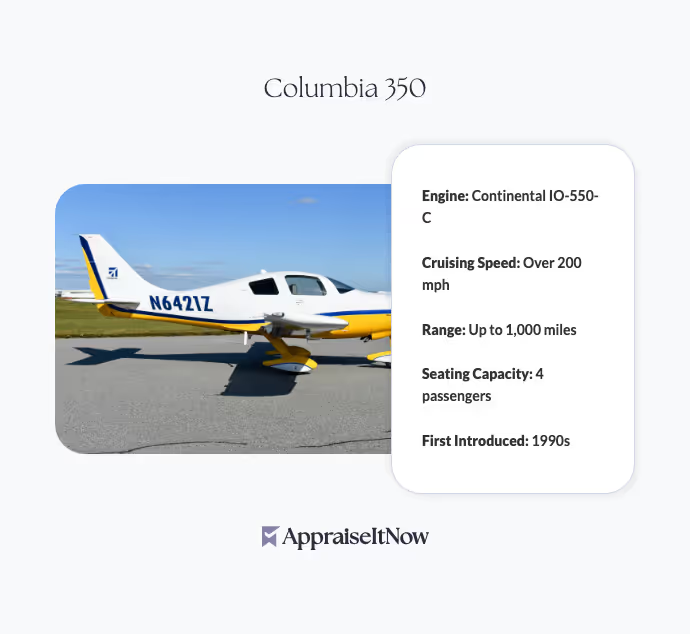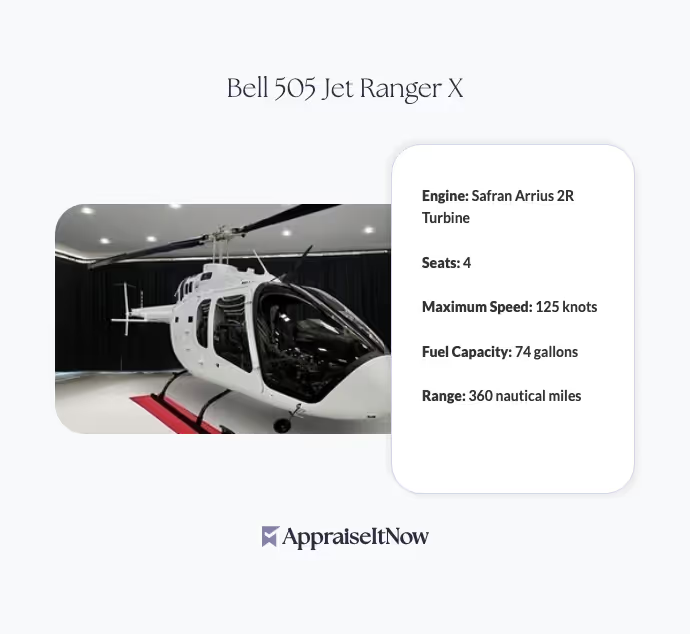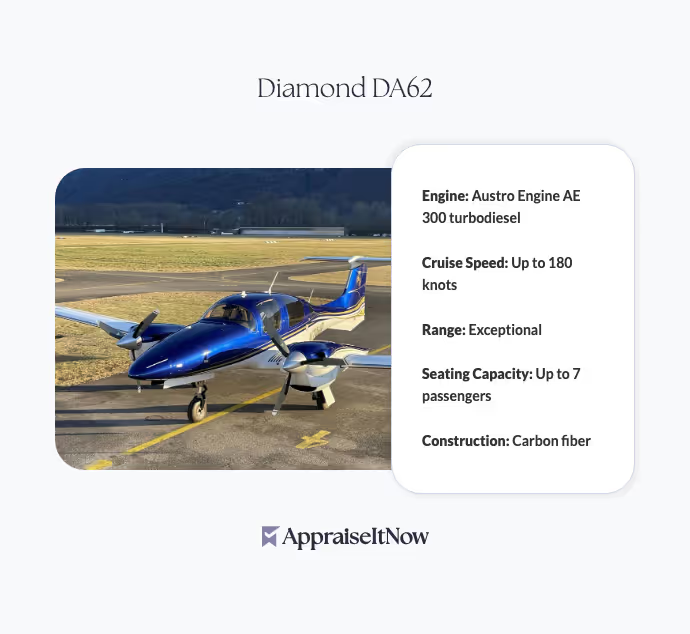<h1>How to Get Your Cessna 182 Skylane Appraised</h1>
<p>The Cessna 182 Skylane represents one of general aviation's most reliable workhorses, commanding market values between <strong>$55,000 and $75,000</strong> depending on year, condition, and specifications. Whether you're planning to buy, sell, insure, or simply understand your aircraft's worth, securing a professional appraisal provides the documentation and expert analysis you need to make informed decisions about this valuable asset.</p>
<h2>Understanding Cessna 182 Skylane Market Value</h2>
<p>The Cessna 182 has maintained its position as a premier general aviation aircraft since its introduction in 1956, with over 23,000 units manufactured worldwide. This extensive production history means you'll find examples ranging from vintage 1950s models to modern variants, each commanding different valuations based on age, condition, and equipment configuration. The aircraft's <strong>230-horsepower engine</strong>, <strong>170-knot cruising speed</strong>, and spacious four-seat cabin have made it the preferred choice for private pilots, flight schools, and small businesses engaging in everything from aerial photography to light cargo transport.</p>
<p>When evaluating a Cessna 182, your aircraft's value depends significantly on factors beyond simple age. A well-maintained 1977 Cessna 182Q with comprehensive overhauls, modern avionics, and active flight logs may command premium prices, while a newer model with deferred maintenance could fall below baseline valuations. This is why professional appraisals become essential—they account for the technical details and market dynamics that casual inspections miss.</p>
<div class="callout tip"><p><strong>Valuation Driver</strong></p>
<p>Engine time-since-overhaul represents one of the single largest value factors, often accounting for 15-20% of total aircraft worth depending on remaining hours.</p></div>
<h2>Key Specifications That Affect Your Skylane's Value</h2>
<p>The Cessna 182's appeal to collectors and operators stems from its remarkable versatility. The aircraft achieves substantial payload capacity—critical for operators planning cross-country flights or aerial work—while maintaining forgiving landing characteristics that make it accessible to pilots of varying experience levels. The aircraft's <strong>retractable landing gear option</strong>, <strong>aerobatic certification</strong>, and ability to accommodate <strong>floats or skis</strong> create multiple market niches, each valuing the aircraft differently.</p>
<p>Recent variants introduced improved glass cockpit avionics, more powerful engines, and enhanced interior appointments, creating distinct valuation tiers within the Skylane family. Whether you're evaluating an older fixed-gear model or a modern diesel-equipped example with advanced avionics, understanding these technical distinctions helps you contextualize your aircraft's position within the broader market. For context on how specialized equipment affects asset valuation, consider reviewing guidance on <a href="/types/equipment-and-machinery">equipment and machinery appraisals</a>.</p>
<h2>Operating Costs and Value Implications</h2>
<p>If you're wondering about the <strong>hourly cost to run a Cessna 182</strong>, understanding operational expenses helps explain why aircraft valuation extends beyond purchase price. Most operators report direct operating costs ranging from $400 to $600 per flight hour, including fuel, oil, maintenance reserves, and component reserves. For aircraft approaching major overhaul points, buyers factor projected engine overhaul costs—typically <strong>$35,000 to $50,000</strong>—into their purchase decisions, directly impacting appraised values.</p>
<p>An <strong>annual inspection</strong> on a Cessna 182 typically costs $2,000 to $4,000 depending on your mechanic and aircraft condition, representing an ongoing consideration that affects ownership desirability. Aircraft requiring extensive inspection items or component replacements see proportional value reductions, making detailed condition assessment a critical component of any professional appraisal.</p>
<div class="callout note"><p><strong>Cost Consideration</strong></p>
<p>Calculating an aircraft's true value requires adding anticipated overhaul costs to current operating expenses, then comparing that total investment against market alternatives like similar aircraft or newer models.</p></div>
<h2>The Cessna 182's Reputation Among Pilots</h2>
<p>Pilots frequently ask, <strong>"Is a Cessna 182 hard to fly?"</strong> The answer drives significant market appeal—the Skylane's handling characteristics remain forgiving and intuitive, making it accessible to private pilots while offering enough performance for experienced operators. This broad appeal supports stable demand across the market, even as newer aircraft models enter the marketplace. The aircraft's <strong>robust construction</strong> and proven track record in air ambulance operations further validate its reliability reputation.</p>
<p>The question of capability matters to appraisers because it affects resale potential. Aircraft known for exceptional safety records and straightforward handling maintain stronger residual values than those requiring specialized training or carrying accident histories. A Cessna 182's clean operational history and positive pilot feedback significantly enhance its market positioning and appraisal results.</p>
<h2>Range and Performance Considerations</h2>
<p>Understanding how far a <strong>Cessna 182 Skylane can fly</strong> helps establish its market utility. With a useful range of approximately 800-900 nautical miles under typical conditions, the aircraft enables legitimate cross-country operations while maintaining conservative fuel reserves. This extended range capability supports demand from operators planning regular long-distance flights, tour operators offering scenic flights, and businesses requiring regional coverage.</p>
<p>Can a Cessna 182 carry four adults? Yes, with careful attention to weight and balance calculations. This four-seat capability—combined with robust construction and real cross-country capability—positions the Skylane favorably against competing aircraft when establishing market value. Professional appraisals account for the aircraft's actual useful load and how effectively it meets mission requirements compared to alternatives.</p>
<h2>Choosing Professional Appraisal Services</h2>
<p>When selecting an appraiser for your Cessna 182, you're seeking expertise in general aviation asset valuation. Look for appraisers holding credentials from recognized aviation organizations and possessing documented experience with the Skylane specifically. Similar to how <a href="/types/airplane">airplane and aircraft</a> appraisals require specialized knowledge, aviation professionals understand the technical details, market comparables, and regulatory factors affecting aircraft values.</p>
<p>Professional appraisers conduct comprehensive inspections examining airframe condition, engine status, avionics capabilities, interior condition, and maintenance history. They compare your specific aircraft against recent comparable sales, accounting for regional variations in aircraft demand and availability. The resulting appraisal report provides documentation acceptable to insurance companies, lenders, and regulatory agencies—essential for legitimate transaction and coverage purposes.</p>
<p>AppraiseItNow connects you with <strong>USPAP-compliant aviation appraisers</strong> holding credentials from AAA, ISA, ASA, and other recognized professional organizations. Our network of credentialed experts specializes in general aviation aircraft, ensuring your Cessna 182 receives accurate, defensible valuation based on current market conditions and detailed condition assessment.</p>
<h2>Documentation and Preparation</h2>
<p>Preparing your Cessna 182 for professional appraisal requires organizing essential documentation. Gather your aircraft's logbooks covering engine time, maintenance records, airframe history, and any significant repairs or upgrades. Documentation of major components—including engine overhauls, alternator replacements, or avionics installations—directly supports the appraiser's value conclusions.</p>
<p>Photographs from multiple angles, particularly showing overall condition, panel configuration, and any visible wear or damage, help appraisers understand what you're evaluating. Recent maintenance invoices demonstrate your commitment to proper aircraft care, supporting higher valuations. If your Cessna 182 has special features—upgraded engines, advanced avionics, or rare configurations—highlight these when scheduling your appraisal so the professional can allocate appropriate valuation analysis.</p>
<div class="callout tip"><p><strong>Preparation Strategy</strong></p>
<p>Organizing your aircraft's complete maintenance history before appraisal typically results in 10-15% higher valuations by demonstrating diligent ownership and reducing appraiser concerns about hidden condition issues.</p></div>
<h2>Insurance and Liability Considerations</h2>
<p>Obtaining a professional appraisal serves critical insurance purposes. Aviation insurance policies typically require accurate aircraft valuations to ensure adequate coverage for total loss scenarios. Your Cessna 182's appraised value establishes the agreed-upon replacement cost, eliminating disputes should claims arise. For general aviation operators, this documentation becomes particularly important given the high replacement costs for quality aircraft and potential liability exposure.</p>
<p>Professional appraisals also support estate planning and tax documentation purposes. If you're transferring aircraft ownership, establishing a beneficiary's inheritance, or managing multi-asset portfolios, credible appraisals provide the documentation that tax authorities and family members require. This resembles how <a href="/types/personal-property">personal property</a> valuations serve similar purposes in broader asset management contexts.</p>
<h2>Market Timing and Valuation Frequency</h2>
<p>Aviation markets experience cyclical variations based on fuel prices, interest rates, and economic conditions affecting discretionary flying activity. Your Cessna 182's current market value may differ significantly from historical prices or dealer asking prices. Professional appraisers track these market dynamics, adjusting their valuations based on recent comparable sales and current demand indicators.</p>
<p>Consider updating your aircraft's appraisal every 3-5 years, or immediately before planned sales or significant insurance changes. This regular valuation practice ensures your coverage remains adequate and provides baseline documentation should circumstances change. Similar to how <a href="/types/recreational-vehicle">recreational vehicle</a> values fluctuate seasonally, aircraft values shift based on market conditions that professional appraisers monitor continuously.</p>
<h2>Understanding Specialized Aircraft Values</h2>
<p>For operators considering vintage Cessna 182 variants or experimental modifications, understanding specialized valuation becomes important. Certain configurations—particularly earlier fixed-gear models or aircraft equipped with specialized equipment for aerial work—may appeal to niche markets commanding different prices. Professional appraisers recognize these specialized segments and can identify whether your particular aircraft serves a broad market or requires specialized marketing positioning.</p>
<div class="callout note"><p><strong>Key Takeaway</strong></p>
<p>A certified appraisal of your Cessna 182 Skylane provides accurate market valuation, essential documentation for insurance and transactions, and professional guidance that protects your investment. Whether you're buying, selling, or simply verifying your aircraft's worth, professional appraisal services deliver the credible, defensible documentation that stands up to institutional and legal standards while ensuring your Skylane's true value is properly recognized in the marketplace.</p></div>
















